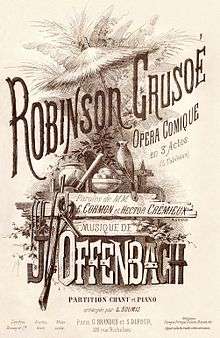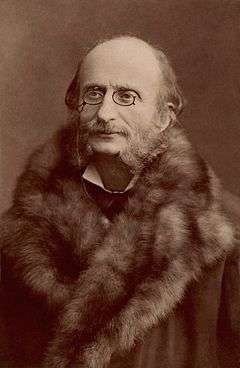Robinson Crusoé
Robinson Crusoé is an opéra comique, or operetta, by Jacques Offenbach. The French libretto was written by Eugène Cormon and Hector-Jonathan Crémieux, which was loosely adapted from the novel Robinson Crusoe by Daniel Defoe, though the work owes more to British pantomime than to the book itself.
Performance history
Robinson Crusoé was first staged at the Opéra-Comique (Salle Favart), on 23 November 1867 with Vendredi, the 'Man Friday' role, sung by Célestine Galli-Marié, later to achieve fame as the first Carmen. Despite a positive reception by the public and press, no professional theatre played the work after its premiere until 1973 at the Camden Festival. In 1983 it was staged and toured by Kent Opera; Opera della Luna's 1994 production of the work also played at the Iford Arts Festival in 2004. Ohio Light Opera produced the work in 1996.
Roles

| Role | Voice type | Premiere cast, 23 November 1867, (Conductor: - ) |
|---|---|---|
| Robinson Crusoé | tenor | Montaubry |
| Vendredi (Man Friday) | mezzo-soprano | Célestine Galli-Marié |
| Edwige, Robinson's fiancée | soprano | Marie Cico |
| Suzanne, a servant | soprano | Caroline Girard |
| Toby, a servant | tenor | Charles-Auguste Ponchard |
| Jim Cocks, a neighbour then cannibal chef | tenor[1] | Charles-Louis Sainte-Foy |
| Sir William Crusoé | bass | Crosti |
| Lady Deborah Crusoé | mezzo-soprano | Antoinette-Jeanne Révilly |
| Will Atkins | bass | François Bernard |
| Sailors, natives, etc | ||
Synopsis

Act 1
At the Crusoe family home in Bristol, Sunday tea is served. Robinson confides in Toby that he has booked them both to South America, but he is overheard by Toby's fiancée, Suzanne. Robinson decides to go to sea alone, seeking fortune for himself, for Edwige and his family.
Act 2
Six years later, on a desert island at the mouth of the Orinoco (after having been captured by pirates), Robinson has only one companion, Friday, whom he rescued just as he was being sacrificed to the gods by the cannibal tribe on the island. Robinson dreams of Edwige, and tries in vain to explain all this to Friday.
Elsewhere on the island, Edwige, along with Suzanne and Toby have arrived to look for Robinson, although their ship was also attacked by pirates and they were set adrift. Toby and Suzanne, captured by the cannibals, are presented to the cannibals' chef, who turns out to be from Bristol (where he had run away from years before), Jim Cocks. He tells them that they will be the cannibals' meal that evening. At sunset, Edwige is brought in by natives, who believe that she is a white goddess because of her fair looks. Friday spies all this, but falls in love with Edwige. When the fire is lit, he lets off Robinson's pistol, the natives flee, and he rescues Edwige, Suzanne, Toby and Jim Cocks.
Act 3
The next day in Robinson's hut, he discovers Edwige sleeping and they are joyfully reunited, while the rest of the English party are pleased to learn that Friday's master is Robinson. Friday explains that the pirates have left their ship, allowing the English the opportunity to re-take to return to England while the pirates feast and dance.
Robinson, pretending to be mad, fools the pirates with a story of treasure buried in the jungle and the pirates go off to find it, only to be caught by the cannibals. Robinson next wields the pirates' guns and the pirates plead to be saved. Robinson agrees, and all set sail for Bristol once again, with Captain Atkins marrying Robinson and Edwige at sea.
Recordings
Opera Rara have released a recording made in English in London in 1980. This was conducted by Alun Francis with the Royal Philharmonic Orchestra and the Geoffrey Mitchell Choir. The cast included Roderick Kennedy (Sir William Crusoe), Enid Hartle (Lady Deborah Crusoe), Alan Opie (Jim Cocks), Wyndham Parfitt (Will Atkins), Yvonne Kenny (Edwige), John Brecknock (Robinson Crusoé), Marilyn Hill Smith (Suzanne), Alexander Oliver (Toby), and Sandra Browne (Man Friday).
References
Notes
- ↑ In fact designated as 'trial' after the singer Antoine Trial
Sources
- Lamb, Andrew, "Robinson Crusoé" in The New Grove Dictionary of Opera, ed. Stanley Sadie (London, 1992) ISBN 0-333-73432-7
- French profile of the work
